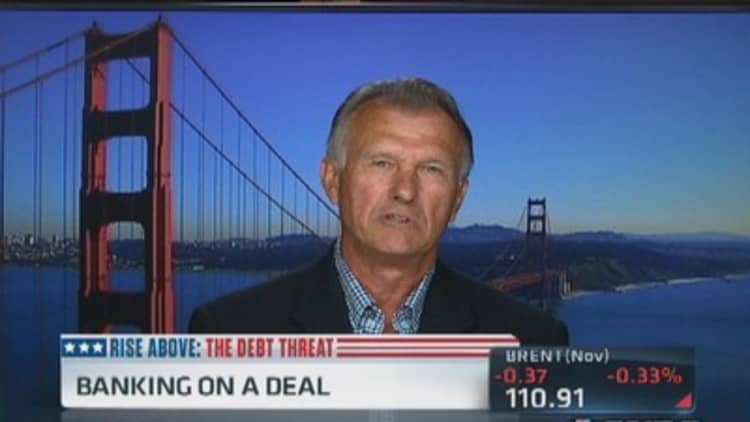Even if the U.S. government fails to raise the debt ceiling in a timely manner and defaults on its debt, Treasury yields are unlikely to rise much, Capital Economics said.
"We would expect U.S. Treasury yields to jump following any default, with the 10-year swiftly topping 3 percent, but not to soar above 4 percent," Jessica Hinds and Julian Jessop, economists at Capital Economics, said in a note.
The 10-year Treasury yield is currently at 2.683 percent, up slightly from 2.65 percent on October 1, when the U.S. government shutdown began, according to Reuters data. Credit default swaps insuring against a sovereign default of 10-year U.S. bonds have spiked by more than 50 percent since late September.
(Read more: World's top bankers warn of dire consequences if US defaults)
Any default is likely to be temporary, the Capital Economics analysts noted. "Market participants would probably continue to draw some distinction between Treasury securities where payments are falling due shortly and those whose servicing is unlikely to be affected by a short-lived default," the note said.
Shorter-term Treasury bills have reacted much more sharply to the government impasse, with yields rising to 0.3220 percent from around 0.0837 percent on October 1, according to Reuters data.

They also expect reassuring moves by rating agencies and regulators and a possible change in tone from major foreign holders of U.S. debt, such as China, could limit bond price declines. U.S. yields should also be capped by an extended period of near-zero interest rates and purchases by the Federal Reserve, they said.
Not everyone is sanguine on the possible market reaction to a default.
"It's more complicated than saying people would get their money back eventually," said Geoffrey Lunt, senior product specialist for fixed income at HSBC. "If it was a company, you would be very concerned indeed, even if you think they will eventually pay," he noted.
"There are institutions and individuals who rely on those coupons being paid. I appreciate there are contingencies," on prioritizing certain payments, he said. "But I'm not sure just saying, well, you'll get your money back eventually, is the same as saying there's no issue at all."
(Read more: Debt default damage already unfolding)
In a recent note, Nomura said it also didn't believe the market would take a default, however temporary, in its stride. "The consequences of this scenario would most likely be extreme and just the sheer fact of getting closer to it may have serious market implications, even if the risk seems remote," it said, although it noted it believes this scenario is unlikely.
"If we approach the point where the debt limit becomes binding without a clear path to raising it, money markets could be disrupted as institutions hoard cash to cover event risk and in general markets as investors reposition portfolios toward safe assets causing an imminent inflection point in risk markets," Nomura said. "A U.S. default on interest and principal would limit the infusion of cash flows into the market, potentially triggering contagion," it said.
"A drawn out delay of payments could echo a 'Lehman-like' event in the sense that money markets would be so extremely affected."
(Read more: How a US debt default could hit your finances)
To be sure, Capital Economics does have some caveats to its view. It doesn't expect a default to spur significant, paradoxical, safe-haven demand for Treasurys. While the 2011 budget standoff resulted in safe-haven Treasury demand, the euro zone was still in crisis then, it noted. "Many investors could, and surely would, turn to alternative safe havens."
In addition, "having defaulted once, the U.S. government might find it had to pay a higher yield on its debt than otherwise for the foreseeable future," the note said.
—CNBC.Com's Leslie Shaffer; Follow her on Twitter @LeslieShaffer1

